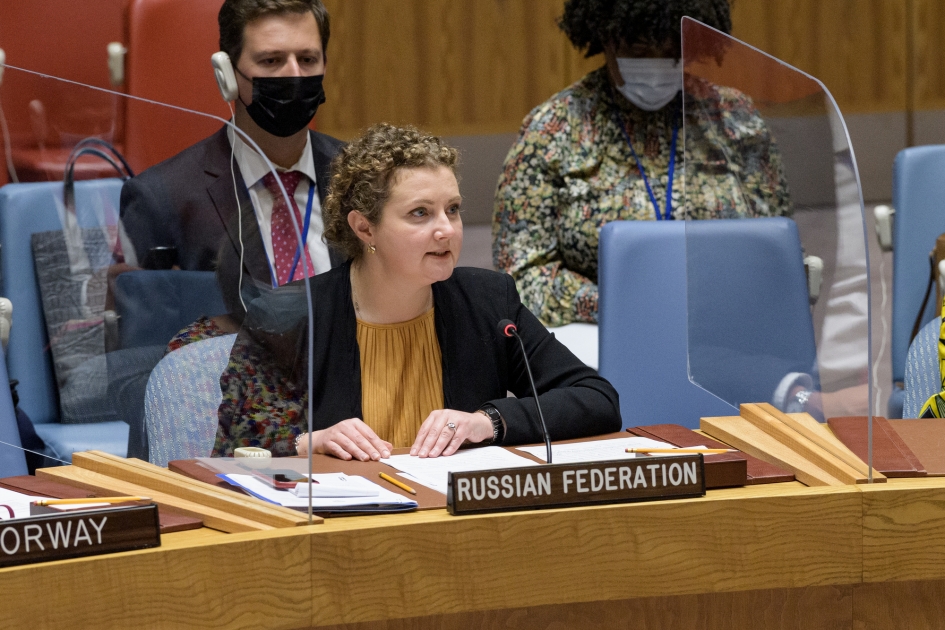Statement by Deputy Permanent Representative Anna Evstigneeva at UNSC briefing "Maintenance of international peace and security"
Mme.President,
We welcome the statements made by the representatives of the Elders at today’s meeting of the Security Council. No one ever doubts the need to strengthen multilateralism in international relations, the importance of protecting and promoting it at the United Nations, which together with its Security Council constitutes the world’s core negotiations platform. We followed your assessments very carefully. They are very meaningful i.a. in view of the fact that you used to have an opportunity to address tasks at the United Nations agenda.
Mr. Lakhdar Brahimi contributed to resolving complex crises in Afghanistan, Iraq, Syria, and took part in elaborating new approaches in the area of UN peacekeeping. Ms. Mary Robinson is an acknowledged reference example in promoting human rights both at home and globally. We commend your principled stance on many issues.
We also welcome other Elders present in this room today – former presidents Ellen Johnson Sirleaf and Ernesto Zedillo.
Mme.President,
The present-day system of international relations is going through a phase of deep transformation. Multipolar world order is evolving. New centers of economic development are increasing profile both in regional and global affairs. This is an objective trend.
At the same time, we have to state that instead of establishing equal cooperation, there have been recent attempts to divide countries artificially “by rank”: those who allegedly do the right thing on the one side and those who violate the rules on the other. Thereby advocates of the so-called “rules-based order” usually evade giving any explanations of what those rules actually are and why we need them if there are instruments of the international law (UN Charter in the first place) that clearly stipulate states’ obligations.
We interpret such actions as a striving to appropriate elaboration of decisions that are relevant to the global community and impose on everyone their vision of international relations perspective.
What is even more regretful is the attempts to present the ideology elaborated by separate groups of states as a “guiding light” for the entire humanity. Such “values” are then promoted as a counterweight to all the other views on the world order and configuration of sovereign states. All those who disagree will be confronted with sanctions or even use of force.
Such a patronizing approach further divides the international community. Besides, as we see from the practice, it does not help solve the current problems that are relevant for all states without exception; neither does it settle conflicts which may go on for decades killing hundreds thousand people.
Mme.President,
We are convinced that true multilateralism must rest upon a mutually respectful and equal interaction of all states on a non-ideological and non-politicized basis. This is the only way in which we can sustain mutual trust, improve the overall environment of international relations, and ensure predictability of development of humanity in the face of global challenges.
We believe it futile to prioritize the question of whose values are better or worse. What we need is to recognize that there are other values, accept this fact as a given, and always be mindful of that.
Decisions turn out more solid and resilient when all those who are to implement them have a say in the decision-making. We need to pursue collective efforts and broad consent.
The United Nations, its General Assembly and the Security Council are universal, truly multilateral platforms, everyone acknowledges their authority. In our opinion, a multitude of present-day problems can be solved if we try to strengthen the role of these platforms in global affairs rather than search for their alternative replacements.
Mme.President,
The UN Charter envisages a “division of labor” which endows the Security Council with a unique function to consider issues of international peace and security. We are firmly convinced that however broad the Security Council agenda may be, issues pertaining to conflict resolution must remain at its core. We are always very apprehensive when it comes to “dragging” in the UNSC agenda such episodes that are but indirectly related to its main mandate and subject to consideration at other UN platforms.
It is our understanding that Security Council’s decisions should always account for the principles of non-interference and sovereign equality of states enshrined in the UN Charter. It is unacceptable to try and use the Council against legitimate governments that someone finds unwanted. The experience of recent decades has repeatedly demonstrated that such steps had never brought peace and prosperity to nations.
In conclusion, we would like to call our colleagues in the Council to always seek to elaborate such decisions that would feature a balance of interests acceptable for all sides. This is what we urgently need to overcome the obvious crisis of trust that we are having. On our part, we must say that Russia remains committed to an open, frank and equitable dialogue and commits to finding “common denominators”.
Thank you.
